Report: Understanding and Analysis of UK Healthcare System
VerifiedAdded on 2020/02/03
|14
|4663
|91
Report
AI Summary
This report provides a comprehensive analysis of the UK healthcare system, examining the structure and relationships between the NHS, social care, and independent sectors. It delves into the historical context of the NHS, its establishment, and its evolution, including the influence of the National Insurance Act. The report explores the healthcare landscape in Wales, comparing it to England, and discusses the various services provided, including those related to the elderly and disabled. It addresses key legislation such as the Human Rights Act 1998, the Mental Capacity Act 2005, and the Equality Act, highlighting their impact on NHS practices. Furthermore, the report analyzes the strengths and weaknesses of the NHS, as identified by the NMC code, and discusses the financial aspects, including expenditure and funding sources. The report also examines the theoretical understanding of care and legislation to nursing practice, including services for the elderly, and disabled people, and the role of caregivers. Finally, the report discusses the role of various departments and authorities in maintaining healthcare in urban areas and funding models.
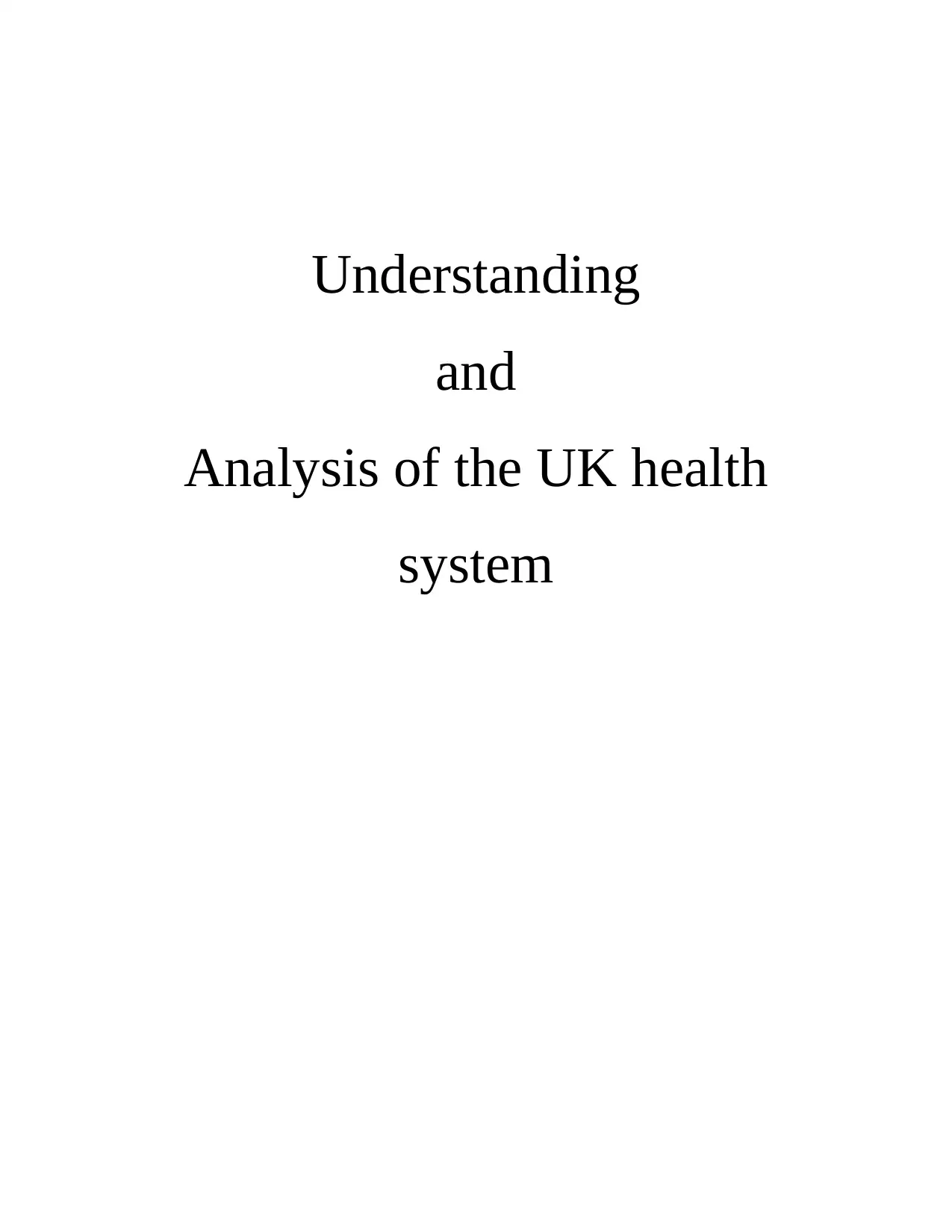
Understanding
and
Analysis of the UK health
system
and
Analysis of the UK health
system
Paraphrase This Document
Need a fresh take? Get an instant paraphrase of this document with our AI Paraphraser
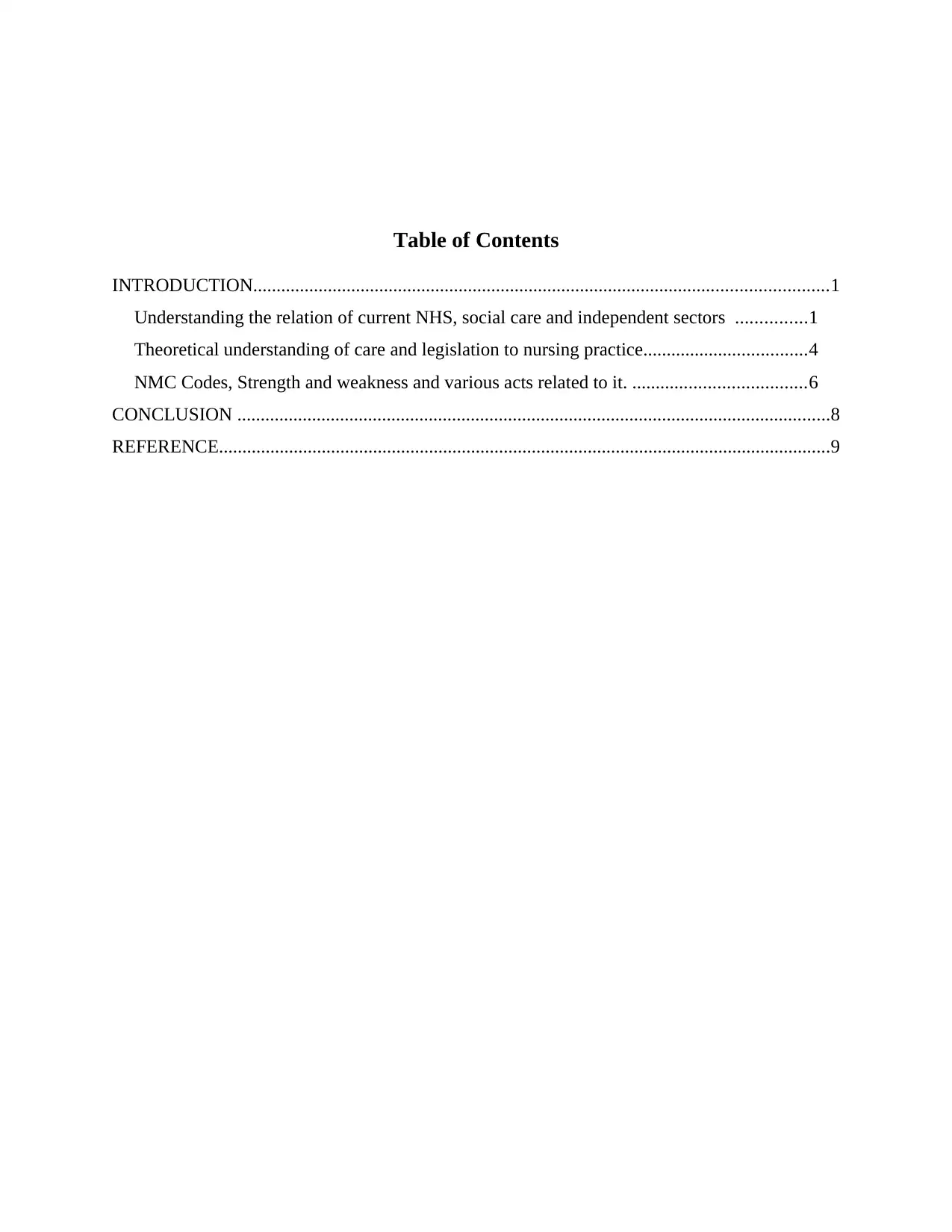
Table of Contents
INTRODUCTION...........................................................................................................................1
Understanding the relation of current NHS, social care and independent sectors ...............1
Theoretical understanding of care and legislation to nursing practice...................................4
NMC Codes, Strength and weakness and various acts related to it. .....................................6
CONCLUSION ...............................................................................................................................8
REFERENCE...................................................................................................................................9
INTRODUCTION...........................................................................................................................1
Understanding the relation of current NHS, social care and independent sectors ...............1
Theoretical understanding of care and legislation to nursing practice...................................4
NMC Codes, Strength and weakness and various acts related to it. .....................................6
CONCLUSION ...............................................................................................................................8
REFERENCE...................................................................................................................................9
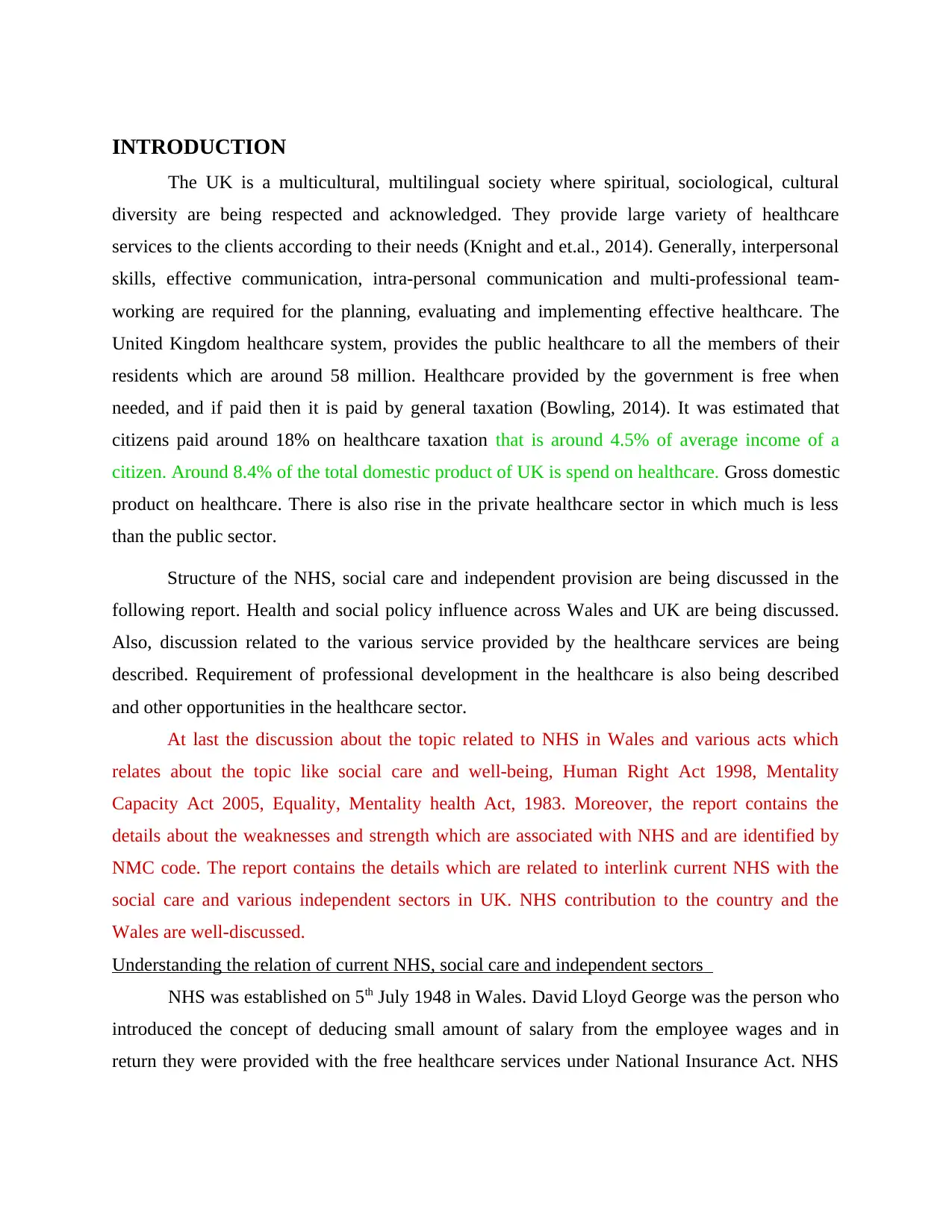
INTRODUCTION
The UK is a multicultural, multilingual society where spiritual, sociological, cultural
diversity are being respected and acknowledged. They provide large variety of healthcare
services to the clients according to their needs (Knight and et.al., 2014). Generally, interpersonal
skills, effective communication, intra-personal communication and multi-professional team-
working are required for the planning, evaluating and implementing effective healthcare. The
United Kingdom healthcare system, provides the public healthcare to all the members of their
residents which are around 58 million. Healthcare provided by the government is free when
needed, and if paid then it is paid by general taxation (Bowling, 2014). It was estimated that
citizens paid around 18% on healthcare taxation that is around 4.5% of average income of a
citizen. Around 8.4% of the total domestic product of UK is spend on healthcare. Gross domestic
product on healthcare. There is also rise in the private healthcare sector in which much is less
than the public sector.
Structure of the NHS, social care and independent provision are being discussed in the
following report. Health and social policy influence across Wales and UK are being discussed.
Also, discussion related to the various service provided by the healthcare services are being
described. Requirement of professional development in the healthcare is also being described
and other opportunities in the healthcare sector.
At last the discussion about the topic related to NHS in Wales and various acts which
relates about the topic like social care and well-being, Human Right Act 1998, Mentality
Capacity Act 2005, Equality, Mentality health Act, 1983. Moreover, the report contains the
details about the weaknesses and strength which are associated with NHS and are identified by
NMC code. The report contains the details which are related to interlink current NHS with the
social care and various independent sectors in UK. NHS contribution to the country and the
Wales are well-discussed.
Understanding the relation of current NHS, social care and independent sectors
NHS was established on 5th July 1948 in Wales. David Lloyd George was the person who
introduced the concept of deducing small amount of salary from the employee wages and in
return they were provided with the free healthcare services under National Insurance Act. NHS
The UK is a multicultural, multilingual society where spiritual, sociological, cultural
diversity are being respected and acknowledged. They provide large variety of healthcare
services to the clients according to their needs (Knight and et.al., 2014). Generally, interpersonal
skills, effective communication, intra-personal communication and multi-professional team-
working are required for the planning, evaluating and implementing effective healthcare. The
United Kingdom healthcare system, provides the public healthcare to all the members of their
residents which are around 58 million. Healthcare provided by the government is free when
needed, and if paid then it is paid by general taxation (Bowling, 2014). It was estimated that
citizens paid around 18% on healthcare taxation that is around 4.5% of average income of a
citizen. Around 8.4% of the total domestic product of UK is spend on healthcare. Gross domestic
product on healthcare. There is also rise in the private healthcare sector in which much is less
than the public sector.
Structure of the NHS, social care and independent provision are being discussed in the
following report. Health and social policy influence across Wales and UK are being discussed.
Also, discussion related to the various service provided by the healthcare services are being
described. Requirement of professional development in the healthcare is also being described
and other opportunities in the healthcare sector.
At last the discussion about the topic related to NHS in Wales and various acts which
relates about the topic like social care and well-being, Human Right Act 1998, Mentality
Capacity Act 2005, Equality, Mentality health Act, 1983. Moreover, the report contains the
details about the weaknesses and strength which are associated with NHS and are identified by
NMC code. The report contains the details which are related to interlink current NHS with the
social care and various independent sectors in UK. NHS contribution to the country and the
Wales are well-discussed.
Understanding the relation of current NHS, social care and independent sectors
NHS was established on 5th July 1948 in Wales. David Lloyd George was the person who
introduced the concept of deducing small amount of salary from the employee wages and in
return they were provided with the free healthcare services under National Insurance Act. NHS
⊘ This is a preview!⊘
Do you want full access?
Subscribe today to unlock all pages.

Trusted by 1+ million students worldwide
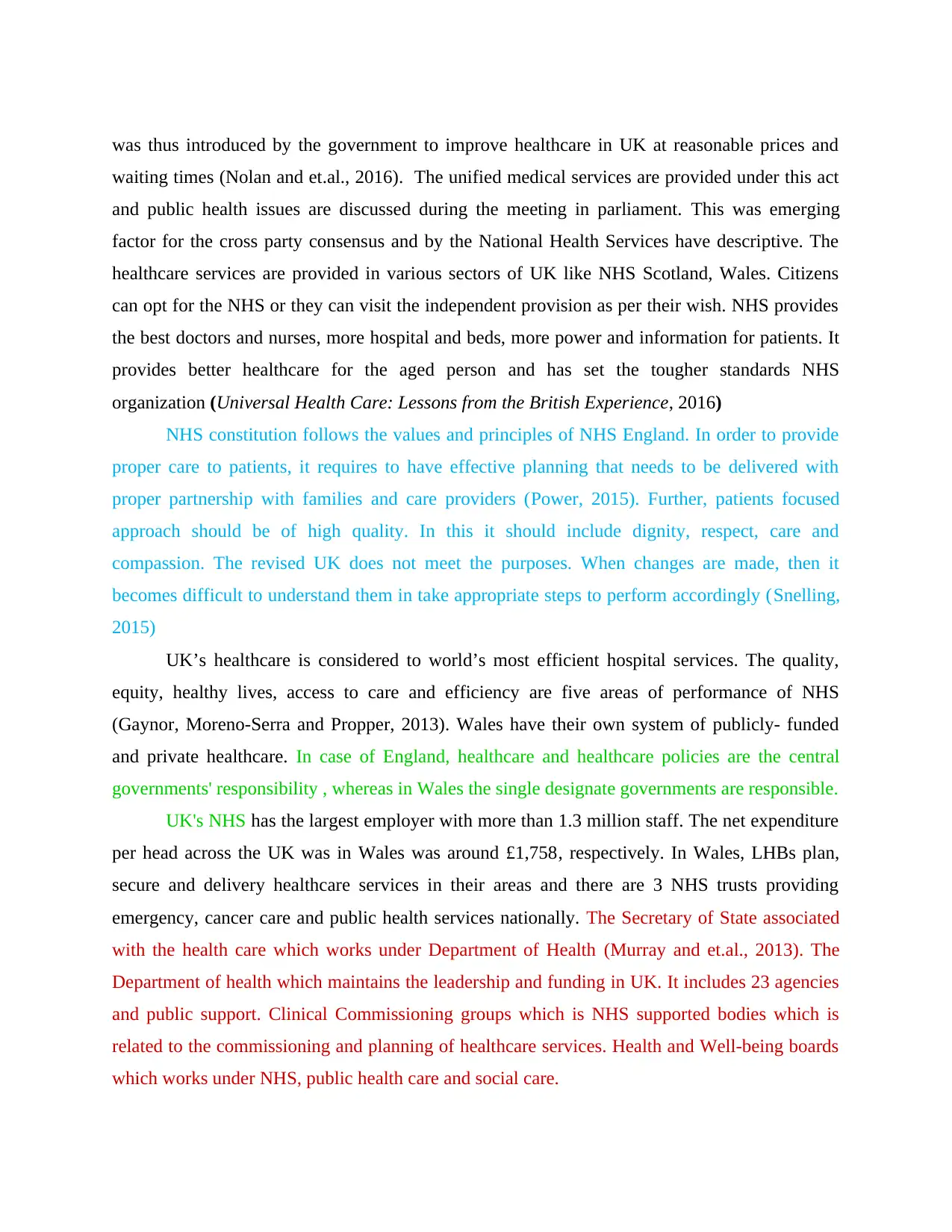
was thus introduced by the government to improve healthcare in UK at reasonable prices and
waiting times (Nolan and et.al., 2016). The unified medical services are provided under this act
and public health issues are discussed during the meeting in parliament. This was emerging
factor for the cross party consensus and by the National Health Services have descriptive. The
healthcare services are provided in various sectors of UK like NHS Scotland, Wales. Citizens
can opt for the NHS or they can visit the independent provision as per their wish. NHS provides
the best doctors and nurses, more hospital and beds, more power and information for patients. It
provides better healthcare for the aged person and has set the tougher standards NHS
organization (Universal Health Care: Lessons from the British Experience, 2016)
NHS constitution follows the values and principles of NHS England. In order to provide
proper care to patients, it requires to have effective planning that needs to be delivered with
proper partnership with families and care providers (Power, 2015). Further, patients focused
approach should be of high quality. In this it should include dignity, respect, care and
compassion. The revised UK does not meet the purposes. When changes are made, then it
becomes difficult to understand them in take appropriate steps to perform accordingly (Snelling,
2015)
UK’s healthcare is considered to world’s most efficient hospital services. The quality,
equity, healthy lives, access to care and efficiency are five areas of performance of NHS
(Gaynor, Moreno-Serra and Propper, 2013). Wales have their own system of publicly- funded
and private healthcare. In case of England, healthcare and healthcare policies are the central
governments' responsibility , whereas in Wales the single designate governments are responsible.
UK's NHS has the largest employer with more than 1.3 million staff. The net expenditure
per head across the UK was in Wales was around £1,758, respectively. In Wales, LHBs plan,
secure and delivery healthcare services in their areas and there are 3 NHS trusts providing
emergency, cancer care and public health services nationally. The Secretary of State associated
with the health care which works under Department of Health (Murray and et.al., 2013). The
Department of health which maintains the leadership and funding in UK. It includes 23 agencies
and public support. Clinical Commissioning groups which is NHS supported bodies which is
related to the commissioning and planning of healthcare services. Health and Well-being boards
which works under NHS, public health care and social care.
waiting times (Nolan and et.al., 2016). The unified medical services are provided under this act
and public health issues are discussed during the meeting in parliament. This was emerging
factor for the cross party consensus and by the National Health Services have descriptive. The
healthcare services are provided in various sectors of UK like NHS Scotland, Wales. Citizens
can opt for the NHS or they can visit the independent provision as per their wish. NHS provides
the best doctors and nurses, more hospital and beds, more power and information for patients. It
provides better healthcare for the aged person and has set the tougher standards NHS
organization (Universal Health Care: Lessons from the British Experience, 2016)
NHS constitution follows the values and principles of NHS England. In order to provide
proper care to patients, it requires to have effective planning that needs to be delivered with
proper partnership with families and care providers (Power, 2015). Further, patients focused
approach should be of high quality. In this it should include dignity, respect, care and
compassion. The revised UK does not meet the purposes. When changes are made, then it
becomes difficult to understand them in take appropriate steps to perform accordingly (Snelling,
2015)
UK’s healthcare is considered to world’s most efficient hospital services. The quality,
equity, healthy lives, access to care and efficiency are five areas of performance of NHS
(Gaynor, Moreno-Serra and Propper, 2013). Wales have their own system of publicly- funded
and private healthcare. In case of England, healthcare and healthcare policies are the central
governments' responsibility , whereas in Wales the single designate governments are responsible.
UK's NHS has the largest employer with more than 1.3 million staff. The net expenditure
per head across the UK was in Wales was around £1,758, respectively. In Wales, LHBs plan,
secure and delivery healthcare services in their areas and there are 3 NHS trusts providing
emergency, cancer care and public health services nationally. The Secretary of State associated
with the health care which works under Department of Health (Murray and et.al., 2013). The
Department of health which maintains the leadership and funding in UK. It includes 23 agencies
and public support. Clinical Commissioning groups which is NHS supported bodies which is
related to the commissioning and planning of healthcare services. Health and Well-being boards
which works under NHS, public health care and social care.
Paraphrase This Document
Need a fresh take? Get an instant paraphrase of this document with our AI Paraphraser
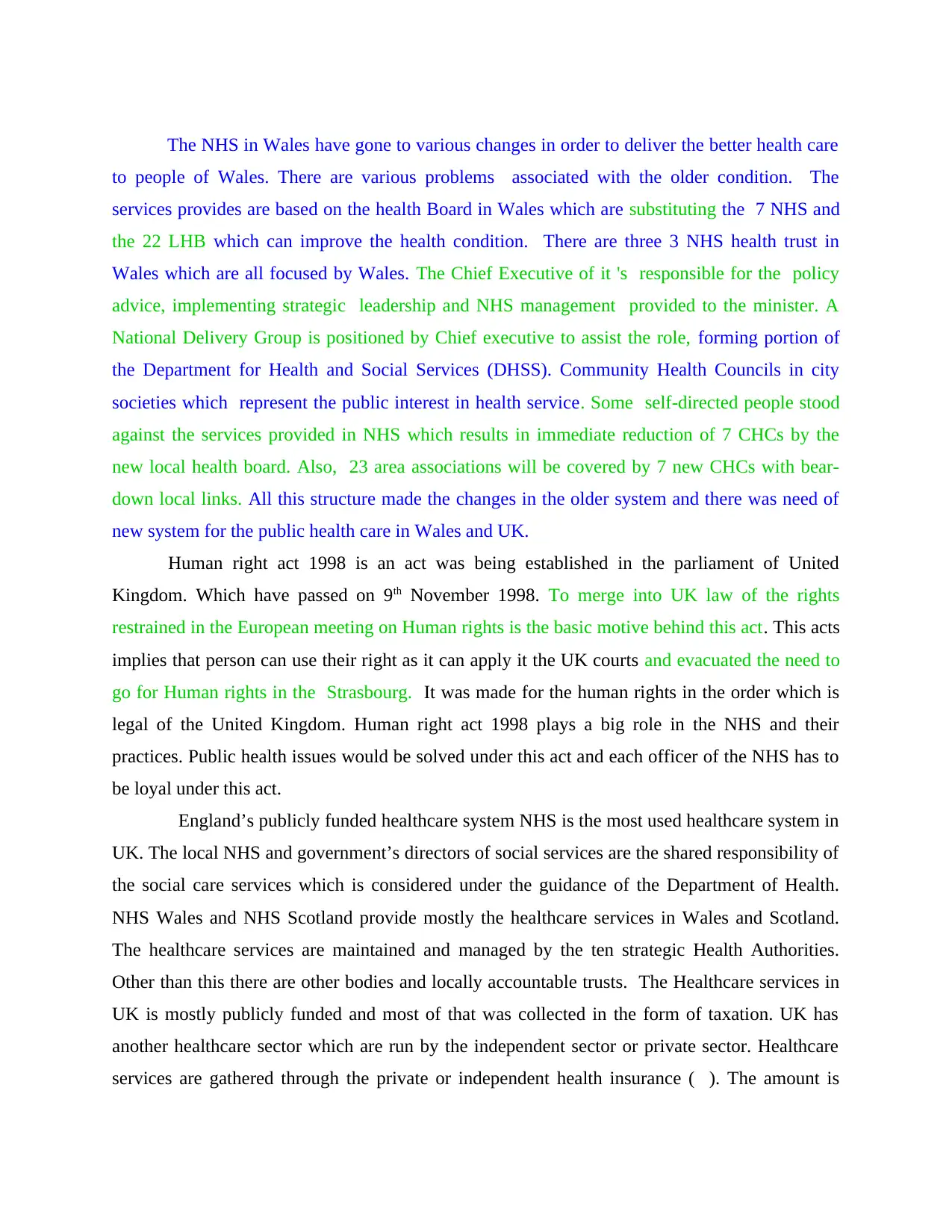
The NHS in Wales have gone to various changes in order to deliver the better health care
to people of Wales. There are various problems associated with the older condition. The
services provides are based on the health Board in Wales which are substituting the 7 NHS and
the 22 LHB which can improve the health condition. There are three 3 NHS health trust in
Wales which are all focused by Wales. The Chief Executive of it 's responsible for the policy
advice, implementing strategic leadership and NHS management provided to the minister. A
National Delivery Group is positioned by Chief executive to assist the role, forming portion of
the Department for Health and Social Services (DHSS). Community Health Councils in city
societies which represent the public interest in health service. Some self-directed people stood
against the services provided in NHS which results in immediate reduction of 7 CHCs by the
new local health board. Also, 23 area associations will be covered by 7 new CHCs with bear-
down local links. All this structure made the changes in the older system and there was need of
new system for the public health care in Wales and UK.
Human right act 1998 is an act was being established in the parliament of United
Kingdom. Which have passed on 9th November 1998. To merge into UK law of the rights
restrained in the European meeting on Human rights is the basic motive behind this act. This acts
implies that person can use their right as it can apply it the UK courts and evacuated the need to
go for Human rights in the Strasbourg. It was made for the human rights in the order which is
legal of the United Kingdom. Human right act 1998 plays a big role in the NHS and their
practices. Public health issues would be solved under this act and each officer of the NHS has to
be loyal under this act.
England’s publicly funded healthcare system NHS is the most used healthcare system in
UK. The local NHS and government’s directors of social services are the shared responsibility of
the social care services which is considered under the guidance of the Department of Health.
NHS Wales and NHS Scotland provide mostly the healthcare services in Wales and Scotland.
The healthcare services are maintained and managed by the ten strategic Health Authorities.
Other than this there are other bodies and locally accountable trusts. The Healthcare services in
UK is mostly publicly funded and most of that was collected in the form of taxation. UK has
another healthcare sector which are run by the independent sector or private sector. Healthcare
services are gathered through the private or independent health insurance ( ). The amount is
to people of Wales. There are various problems associated with the older condition. The
services provides are based on the health Board in Wales which are substituting the 7 NHS and
the 22 LHB which can improve the health condition. There are three 3 NHS health trust in
Wales which are all focused by Wales. The Chief Executive of it 's responsible for the policy
advice, implementing strategic leadership and NHS management provided to the minister. A
National Delivery Group is positioned by Chief executive to assist the role, forming portion of
the Department for Health and Social Services (DHSS). Community Health Councils in city
societies which represent the public interest in health service. Some self-directed people stood
against the services provided in NHS which results in immediate reduction of 7 CHCs by the
new local health board. Also, 23 area associations will be covered by 7 new CHCs with bear-
down local links. All this structure made the changes in the older system and there was need of
new system for the public health care in Wales and UK.
Human right act 1998 is an act was being established in the parliament of United
Kingdom. Which have passed on 9th November 1998. To merge into UK law of the rights
restrained in the European meeting on Human rights is the basic motive behind this act. This acts
implies that person can use their right as it can apply it the UK courts and evacuated the need to
go for Human rights in the Strasbourg. It was made for the human rights in the order which is
legal of the United Kingdom. Human right act 1998 plays a big role in the NHS and their
practices. Public health issues would be solved under this act and each officer of the NHS has to
be loyal under this act.
England’s publicly funded healthcare system NHS is the most used healthcare system in
UK. The local NHS and government’s directors of social services are the shared responsibility of
the social care services which is considered under the guidance of the Department of Health.
NHS Wales and NHS Scotland provide mostly the healthcare services in Wales and Scotland.
The healthcare services are maintained and managed by the ten strategic Health Authorities.
Other than this there are other bodies and locally accountable trusts. The Healthcare services in
UK is mostly publicly funded and most of that was collected in the form of taxation. UK has
another healthcare sector which are run by the independent sector or private sector. Healthcare
services are gathered through the private or independent health insurance ( ). The amount is
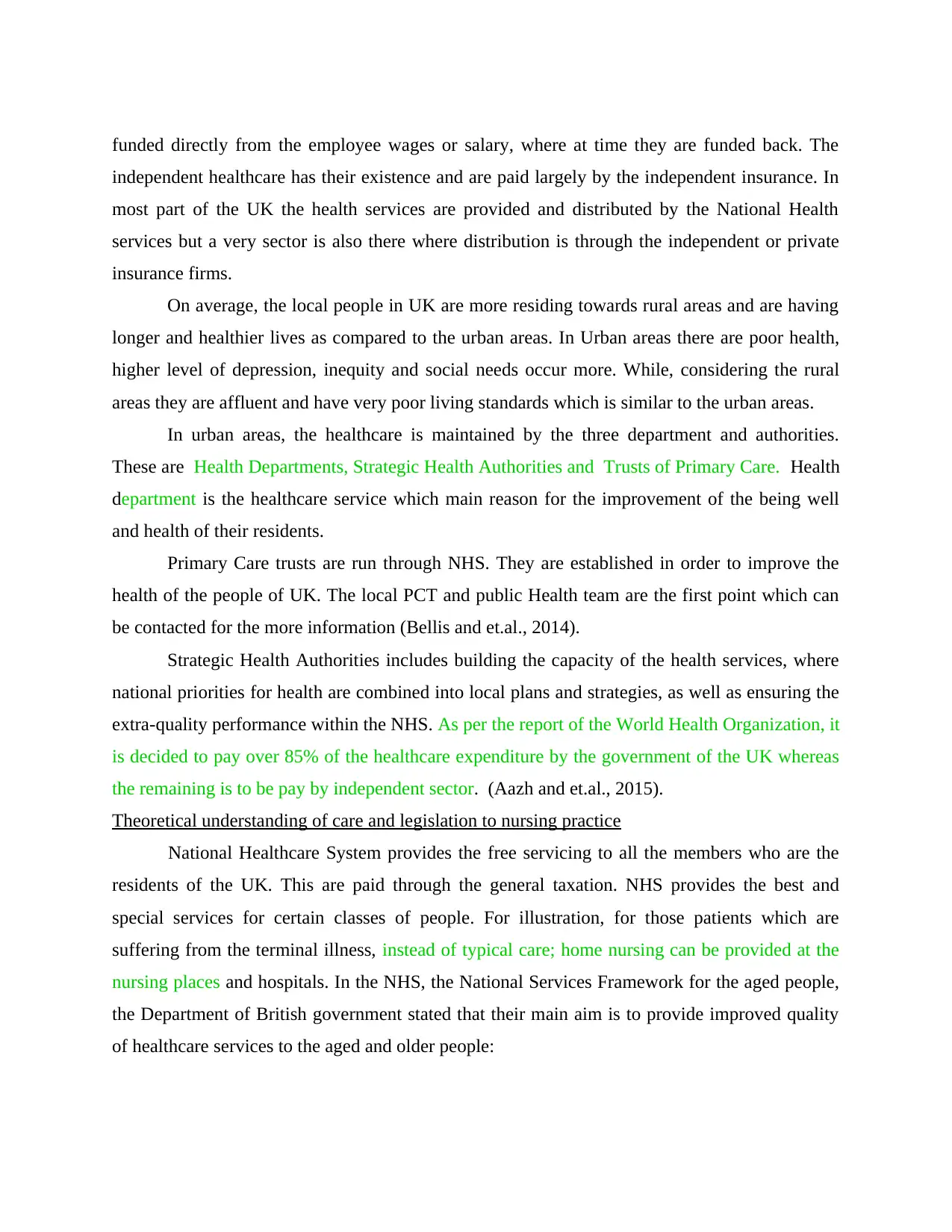
funded directly from the employee wages or salary, where at time they are funded back. The
independent healthcare has their existence and are paid largely by the independent insurance. In
most part of the UK the health services are provided and distributed by the National Health
services but a very sector is also there where distribution is through the independent or private
insurance firms.
On average, the local people in UK are more residing towards rural areas and are having
longer and healthier lives as compared to the urban areas. In Urban areas there are poor health,
higher level of depression, inequity and social needs occur more. While, considering the rural
areas they are affluent and have very poor living standards which is similar to the urban areas.
In urban areas, the healthcare is maintained by the three department and authorities.
These are Health Departments, Strategic Health Authorities and Trusts of Primary Care. Health
department is the healthcare service which main reason for the improvement of the being well
and health of their residents.
Primary Care trusts are run through NHS. They are established in order to improve the
health of the people of UK. The local PCT and public Health team are the first point which can
be contacted for the more information (Bellis and et.al., 2014).
Strategic Health Authorities includes building the capacity of the health services, where
national priorities for health are combined into local plans and strategies, as well as ensuring the
extra-quality performance within the NHS. As per the report of the World Health Organization, it
is decided to pay over 85% of the healthcare expenditure by the government of the UK whereas
the remaining is to be pay by independent sector. (Aazh and et.al., 2015).
Theoretical understanding of care and legislation to nursing practice
National Healthcare System provides the free servicing to all the members who are the
residents of the UK. This are paid through the general taxation. NHS provides the best and
special services for certain classes of people. For illustration, for those patients which are
suffering from the terminal illness, instead of typical care; home nursing can be provided at the
nursing places and hospitals. In the NHS, the National Services Framework for the aged people,
the Department of British government stated that their main aim is to provide improved quality
of healthcare services to the aged and older people:
independent healthcare has their existence and are paid largely by the independent insurance. In
most part of the UK the health services are provided and distributed by the National Health
services but a very sector is also there where distribution is through the independent or private
insurance firms.
On average, the local people in UK are more residing towards rural areas and are having
longer and healthier lives as compared to the urban areas. In Urban areas there are poor health,
higher level of depression, inequity and social needs occur more. While, considering the rural
areas they are affluent and have very poor living standards which is similar to the urban areas.
In urban areas, the healthcare is maintained by the three department and authorities.
These are Health Departments, Strategic Health Authorities and Trusts of Primary Care. Health
department is the healthcare service which main reason for the improvement of the being well
and health of their residents.
Primary Care trusts are run through NHS. They are established in order to improve the
health of the people of UK. The local PCT and public Health team are the first point which can
be contacted for the more information (Bellis and et.al., 2014).
Strategic Health Authorities includes building the capacity of the health services, where
national priorities for health are combined into local plans and strategies, as well as ensuring the
extra-quality performance within the NHS. As per the report of the World Health Organization, it
is decided to pay over 85% of the healthcare expenditure by the government of the UK whereas
the remaining is to be pay by independent sector. (Aazh and et.al., 2015).
Theoretical understanding of care and legislation to nursing practice
National Healthcare System provides the free servicing to all the members who are the
residents of the UK. This are paid through the general taxation. NHS provides the best and
special services for certain classes of people. For illustration, for those patients which are
suffering from the terminal illness, instead of typical care; home nursing can be provided at the
nursing places and hospitals. In the NHS, the National Services Framework for the aged people,
the Department of British government stated that their main aim is to provide improved quality
of healthcare services to the aged and older people:
⊘ This is a preview!⊘
Do you want full access?
Subscribe today to unlock all pages.

Trusted by 1+ million students worldwide
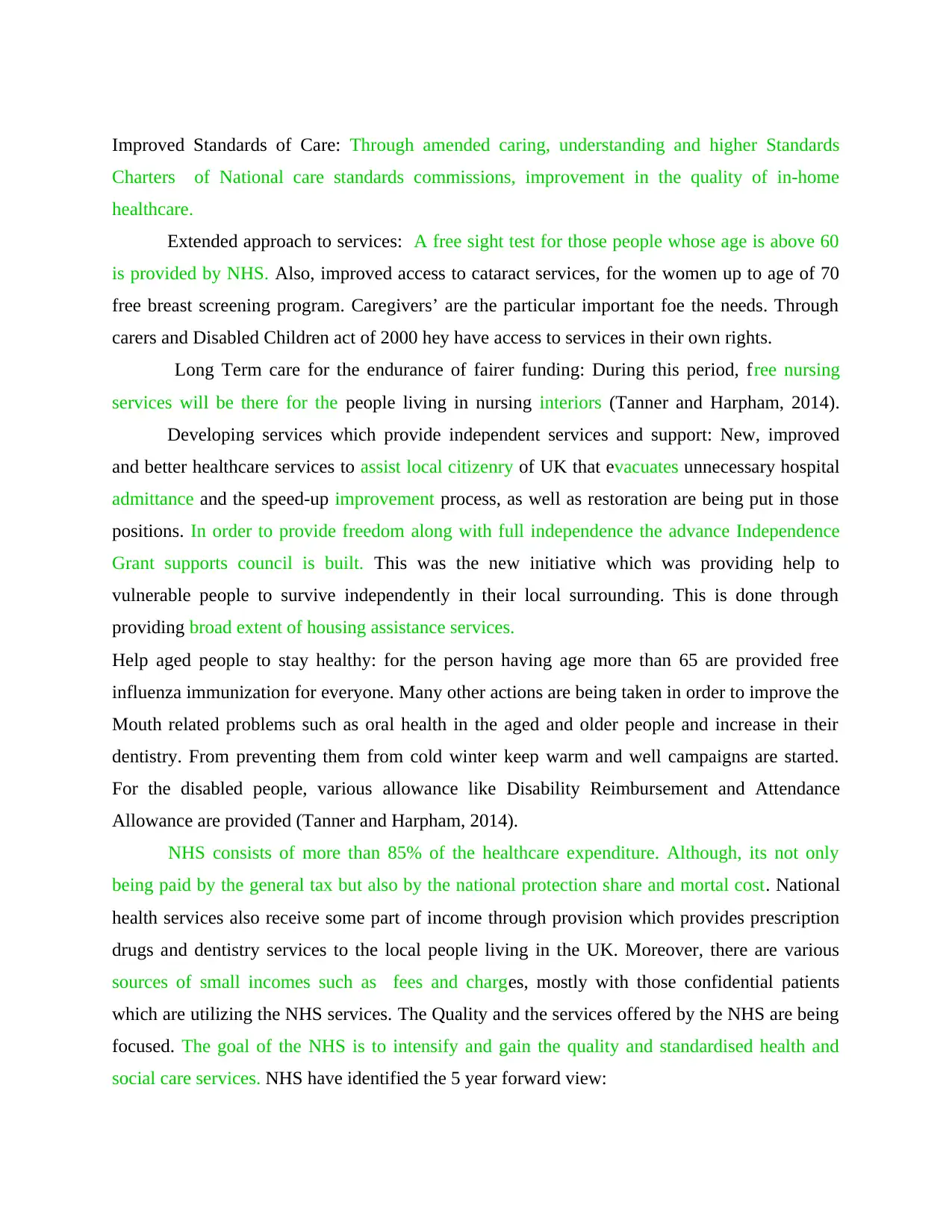
Improved Standards of Care: Through amended caring, understanding and higher Standards
Charters of National care standards commissions, improvement in the quality of in-home
healthcare.
Extended approach to services: A free sight test for those people whose age is above 60
is provided by NHS. Also, improved access to cataract services, for the women up to age of 70
free breast screening program. Caregivers’ are the particular important foe the needs. Through
carers and Disabled Children act of 2000 hey have access to services in their own rights.
Long Term care for the endurance of fairer funding: During this period, free nursing
services will be there for the people living in nursing interiors (Tanner and Harpham, 2014).
Developing services which provide independent services and support: New, improved
and better healthcare services to assist local citizenry of UK that evacuates unnecessary hospital
admittance and the speed-up improvement process, as well as restoration are being put in those
positions. In order to provide freedom along with full independence the advance Independence
Grant supports council is built. This was the new initiative which was providing help to
vulnerable people to survive independently in their local surrounding. This is done through
providing broad extent of housing assistance services.
Help aged people to stay healthy: for the person having age more than 65 are provided free
influenza immunization for everyone. Many other actions are being taken in order to improve the
Mouth related problems such as oral health in the aged and older people and increase in their
dentistry. From preventing them from cold winter keep warm and well campaigns are started.
For the disabled people, various allowance like Disability Reimbursement and Attendance
Allowance are provided (Tanner and Harpham, 2014).
NHS consists of more than 85% of the healthcare expenditure. Although, its not only
being paid by the general tax but also by the national protection share and mortal cost. National
health services also receive some part of income through provision which provides prescription
drugs and dentistry services to the local people living in the UK. Moreover, there are various
sources of small incomes such as fees and charges, mostly with those confidential patients
which are utilizing the NHS services. The Quality and the services offered by the NHS are being
focused. The goal of the NHS is to intensify and gain the quality and standardised health and
social care services. NHS have identified the 5 year forward view:
Charters of National care standards commissions, improvement in the quality of in-home
healthcare.
Extended approach to services: A free sight test for those people whose age is above 60
is provided by NHS. Also, improved access to cataract services, for the women up to age of 70
free breast screening program. Caregivers’ are the particular important foe the needs. Through
carers and Disabled Children act of 2000 hey have access to services in their own rights.
Long Term care for the endurance of fairer funding: During this period, free nursing
services will be there for the people living in nursing interiors (Tanner and Harpham, 2014).
Developing services which provide independent services and support: New, improved
and better healthcare services to assist local citizenry of UK that evacuates unnecessary hospital
admittance and the speed-up improvement process, as well as restoration are being put in those
positions. In order to provide freedom along with full independence the advance Independence
Grant supports council is built. This was the new initiative which was providing help to
vulnerable people to survive independently in their local surrounding. This is done through
providing broad extent of housing assistance services.
Help aged people to stay healthy: for the person having age more than 65 are provided free
influenza immunization for everyone. Many other actions are being taken in order to improve the
Mouth related problems such as oral health in the aged and older people and increase in their
dentistry. From preventing them from cold winter keep warm and well campaigns are started.
For the disabled people, various allowance like Disability Reimbursement and Attendance
Allowance are provided (Tanner and Harpham, 2014).
NHS consists of more than 85% of the healthcare expenditure. Although, its not only
being paid by the general tax but also by the national protection share and mortal cost. National
health services also receive some part of income through provision which provides prescription
drugs and dentistry services to the local people living in the UK. Moreover, there are various
sources of small incomes such as fees and charges, mostly with those confidential patients
which are utilizing the NHS services. The Quality and the services offered by the NHS are being
focused. The goal of the NHS is to intensify and gain the quality and standardised health and
social care services. NHS have identified the 5 year forward view:
Paraphrase This Document
Need a fresh take? Get an instant paraphrase of this document with our AI Paraphraser
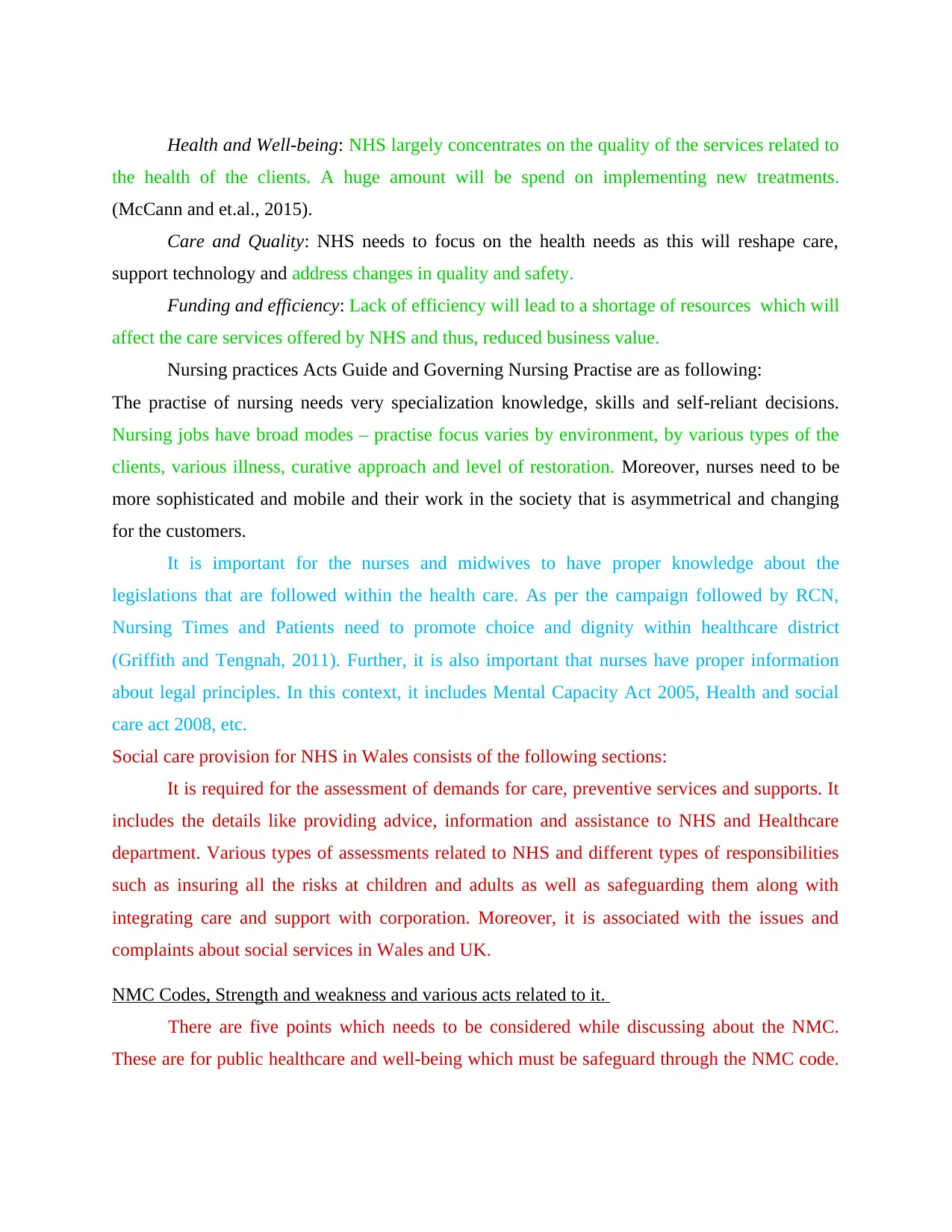
Health and Well-being: NHS largely concentrates on the quality of the services related to
the health of the clients. A huge amount will be spend on implementing new treatments.
(McCann and et.al., 2015).
Care and Quality: NHS needs to focus on the health needs as this will reshape care,
support technology and address changes in quality and safety.
Funding and efficiency: Lack of efficiency will lead to a shortage of resources which will
affect the care services offered by NHS and thus, reduced business value.
Nursing practices Acts Guide and Governing Nursing Practise are as following:
The practise of nursing needs very specialization knowledge, skills and self-reliant decisions.
Nursing jobs have broad modes – practise focus varies by environment, by various types of the
clients, various illness, curative approach and level of restoration. Moreover, nurses need to be
more sophisticated and mobile and their work in the society that is asymmetrical and changing
for the customers.
It is important for the nurses and midwives to have proper knowledge about the
legislations that are followed within the health care. As per the campaign followed by RCN,
Nursing Times and Patients need to promote choice and dignity within healthcare district
(Griffith and Tengnah, 2011). Further, it is also important that nurses have proper information
about legal principles. In this context, it includes Mental Capacity Act 2005, Health and social
care act 2008, etc.
Social care provision for NHS in Wales consists of the following sections:
It is required for the assessment of demands for care, preventive services and supports. It
includes the details like providing advice, information and assistance to NHS and Healthcare
department. Various types of assessments related to NHS and different types of responsibilities
such as insuring all the risks at children and adults as well as safeguarding them along with
integrating care and support with corporation. Moreover, it is associated with the issues and
complaints about social services in Wales and UK.
NMC Codes, Strength and weakness and various acts related to it.
There are five points which needs to be considered while discussing about the NMC.
These are for public healthcare and well-being which must be safeguard through the NMC code.
the health of the clients. A huge amount will be spend on implementing new treatments.
(McCann and et.al., 2015).
Care and Quality: NHS needs to focus on the health needs as this will reshape care,
support technology and address changes in quality and safety.
Funding and efficiency: Lack of efficiency will lead to a shortage of resources which will
affect the care services offered by NHS and thus, reduced business value.
Nursing practices Acts Guide and Governing Nursing Practise are as following:
The practise of nursing needs very specialization knowledge, skills and self-reliant decisions.
Nursing jobs have broad modes – practise focus varies by environment, by various types of the
clients, various illness, curative approach and level of restoration. Moreover, nurses need to be
more sophisticated and mobile and their work in the society that is asymmetrical and changing
for the customers.
It is important for the nurses and midwives to have proper knowledge about the
legislations that are followed within the health care. As per the campaign followed by RCN,
Nursing Times and Patients need to promote choice and dignity within healthcare district
(Griffith and Tengnah, 2011). Further, it is also important that nurses have proper information
about legal principles. In this context, it includes Mental Capacity Act 2005, Health and social
care act 2008, etc.
Social care provision for NHS in Wales consists of the following sections:
It is required for the assessment of demands for care, preventive services and supports. It
includes the details like providing advice, information and assistance to NHS and Healthcare
department. Various types of assessments related to NHS and different types of responsibilities
such as insuring all the risks at children and adults as well as safeguarding them along with
integrating care and support with corporation. Moreover, it is associated with the issues and
complaints about social services in Wales and UK.
NMC Codes, Strength and weakness and various acts related to it.
There are five points which needs to be considered while discussing about the NMC.
These are for public healthcare and well-being which must be safeguard through the NMC code.
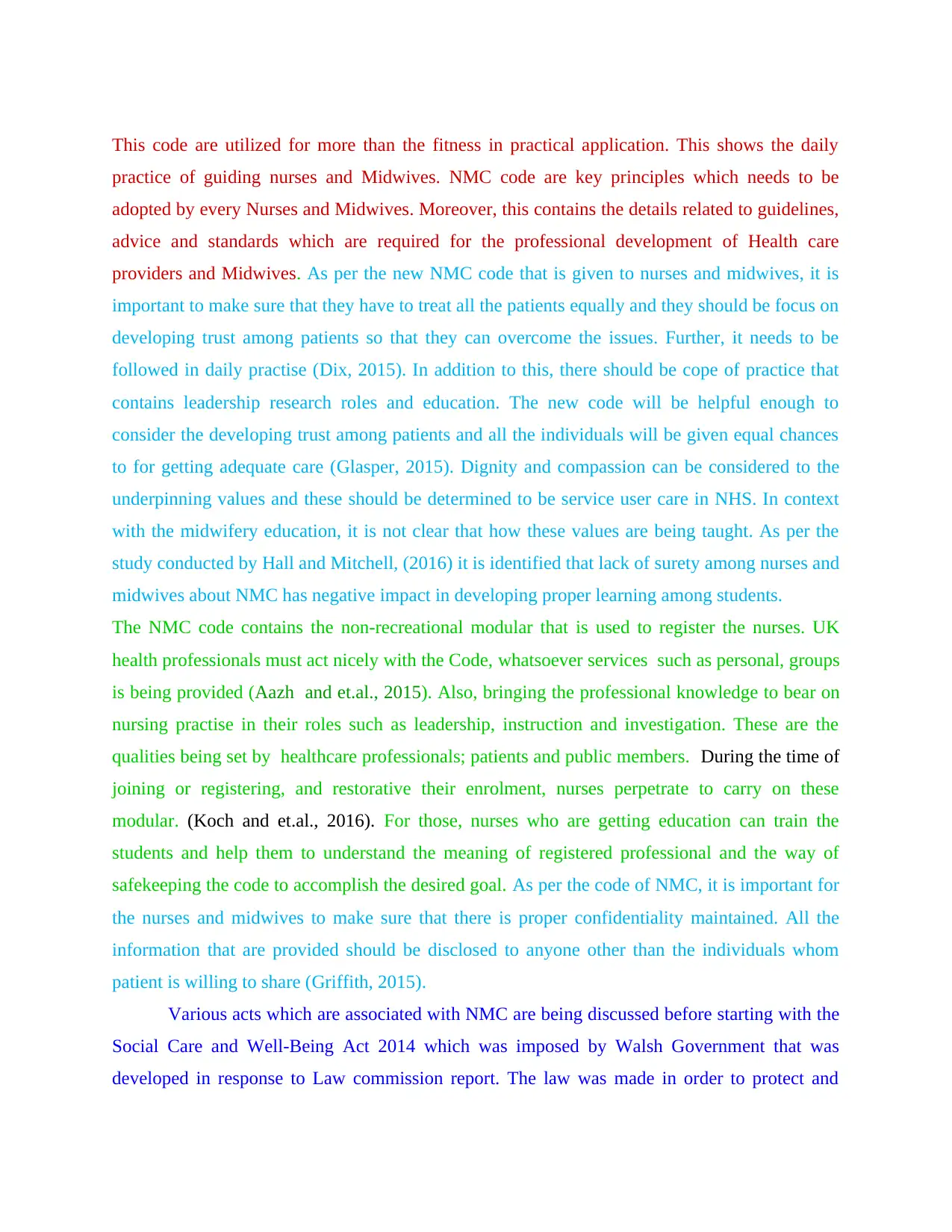
This code are utilized for more than the fitness in practical application. This shows the daily
practice of guiding nurses and Midwives. NMC code are key principles which needs to be
adopted by every Nurses and Midwives. Moreover, this contains the details related to guidelines,
advice and standards which are required for the professional development of Health care
providers and Midwives. As per the new NMC code that is given to nurses and midwives, it is
important to make sure that they have to treat all the patients equally and they should be focus on
developing trust among patients so that they can overcome the issues. Further, it needs to be
followed in daily practise (Dix, 2015). In addition to this, there should be cope of practice that
contains leadership research roles and education. The new code will be helpful enough to
consider the developing trust among patients and all the individuals will be given equal chances
to for getting adequate care (Glasper, 2015). Dignity and compassion can be considered to the
underpinning values and these should be determined to be service user care in NHS. In context
with the midwifery education, it is not clear that how these values are being taught. As per the
study conducted by Hall and Mitchell, (2016) it is identified that lack of surety among nurses and
midwives about NMC has negative impact in developing proper learning among students.
The NMC code contains the non-recreational modular that is used to register the nurses. UK
health professionals must act nicely with the Code, whatsoever services such as personal, groups
is being provided (Aazh and et.al., 2015). Also, bringing the professional knowledge to bear on
nursing practise in their roles such as leadership, instruction and investigation. These are the
qualities being set by healthcare professionals; patients and public members. During the time of
joining or registering, and restorative their enrolment, nurses perpetrate to carry on these
modular. (Koch and et.al., 2016). For those, nurses who are getting education can train the
students and help them to understand the meaning of registered professional and the way of
safekeeping the code to accomplish the desired goal. As per the code of NMC, it is important for
the nurses and midwives to make sure that there is proper confidentiality maintained. All the
information that are provided should be disclosed to anyone other than the individuals whom
patient is willing to share (Griffith, 2015).
Various acts which are associated with NMC are being discussed before starting with the
Social Care and Well-Being Act 2014 which was imposed by Walsh Government that was
developed in response to Law commission report. The law was made in order to protect and
practice of guiding nurses and Midwives. NMC code are key principles which needs to be
adopted by every Nurses and Midwives. Moreover, this contains the details related to guidelines,
advice and standards which are required for the professional development of Health care
providers and Midwives. As per the new NMC code that is given to nurses and midwives, it is
important to make sure that they have to treat all the patients equally and they should be focus on
developing trust among patients so that they can overcome the issues. Further, it needs to be
followed in daily practise (Dix, 2015). In addition to this, there should be cope of practice that
contains leadership research roles and education. The new code will be helpful enough to
consider the developing trust among patients and all the individuals will be given equal chances
to for getting adequate care (Glasper, 2015). Dignity and compassion can be considered to the
underpinning values and these should be determined to be service user care in NHS. In context
with the midwifery education, it is not clear that how these values are being taught. As per the
study conducted by Hall and Mitchell, (2016) it is identified that lack of surety among nurses and
midwives about NMC has negative impact in developing proper learning among students.
The NMC code contains the non-recreational modular that is used to register the nurses. UK
health professionals must act nicely with the Code, whatsoever services such as personal, groups
is being provided (Aazh and et.al., 2015). Also, bringing the professional knowledge to bear on
nursing practise in their roles such as leadership, instruction and investigation. These are the
qualities being set by healthcare professionals; patients and public members. During the time of
joining or registering, and restorative their enrolment, nurses perpetrate to carry on these
modular. (Koch and et.al., 2016). For those, nurses who are getting education can train the
students and help them to understand the meaning of registered professional and the way of
safekeeping the code to accomplish the desired goal. As per the code of NMC, it is important for
the nurses and midwives to make sure that there is proper confidentiality maintained. All the
information that are provided should be disclosed to anyone other than the individuals whom
patient is willing to share (Griffith, 2015).
Various acts which are associated with NMC are being discussed before starting with the
Social Care and Well-Being Act 2014 which was imposed by Walsh Government that was
developed in response to Law commission report. The law was made in order to protect and
⊘ This is a preview!⊘
Do you want full access?
Subscribe today to unlock all pages.

Trusted by 1+ million students worldwide
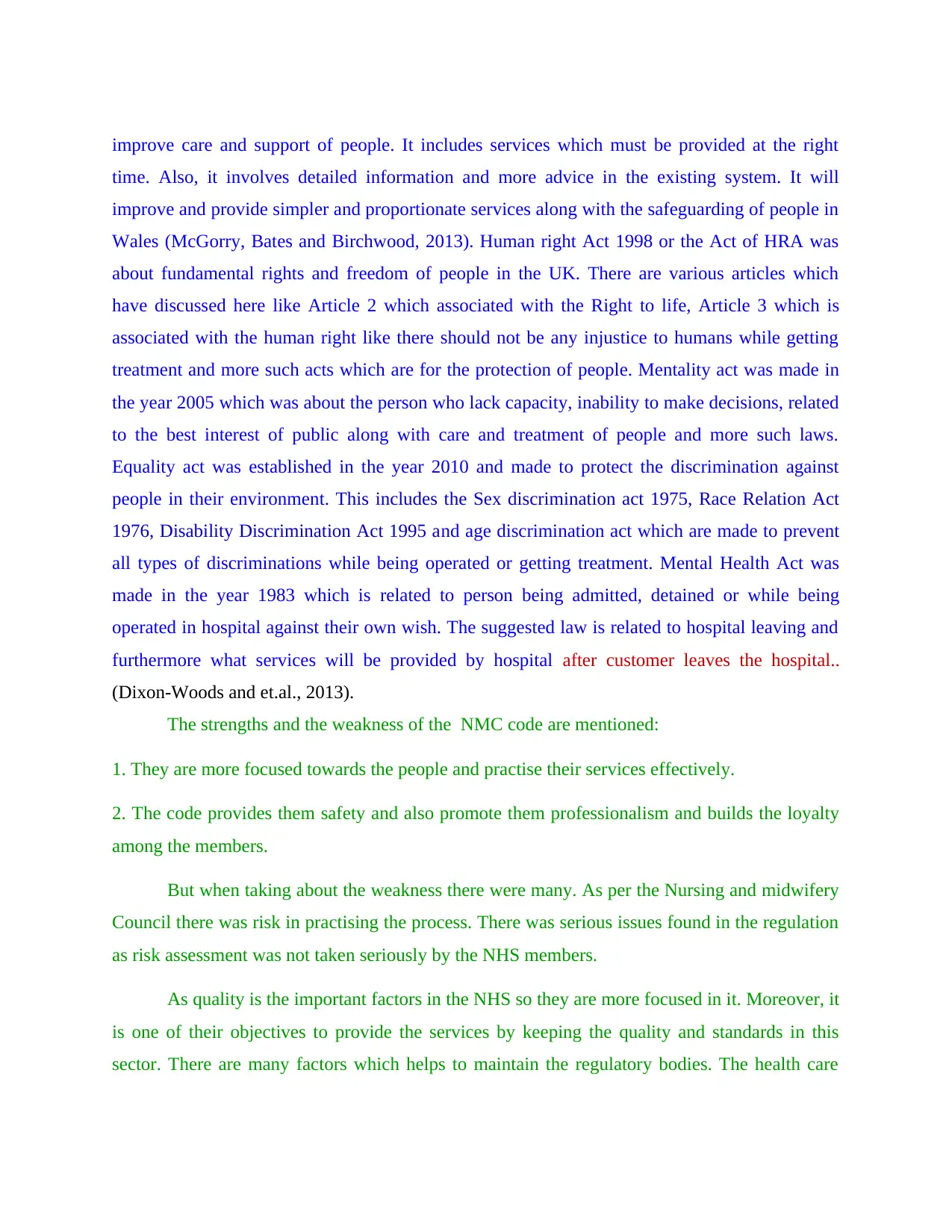
improve care and support of people. It includes services which must be provided at the right
time. Also, it involves detailed information and more advice in the existing system. It will
improve and provide simpler and proportionate services along with the safeguarding of people in
Wales (McGorry, Bates and Birchwood, 2013). Human right Act 1998 or the Act of HRA was
about fundamental rights and freedom of people in the UK. There are various articles which
have discussed here like Article 2 which associated with the Right to life, Article 3 which is
associated with the human right like there should not be any injustice to humans while getting
treatment and more such acts which are for the protection of people. Mentality act was made in
the year 2005 which was about the person who lack capacity, inability to make decisions, related
to the best interest of public along with care and treatment of people and more such laws.
Equality act was established in the year 2010 and made to protect the discrimination against
people in their environment. This includes the Sex discrimination act 1975, Race Relation Act
1976, Disability Discrimination Act 1995 and age discrimination act which are made to prevent
all types of discriminations while being operated or getting treatment. Mental Health Act was
made in the year 1983 which is related to person being admitted, detained or while being
operated in hospital against their own wish. The suggested law is related to hospital leaving and
furthermore what services will be provided by hospital after customer leaves the hospital..
(Dixon-Woods and et.al., 2013).
The strengths and the weakness of the NMC code are mentioned:
1. They are more focused towards the people and practise their services effectively.
2. The code provides them safety and also promote them professionalism and builds the loyalty
among the members.
But when taking about the weakness there were many. As per the Nursing and midwifery
Council there was risk in practising the process. There was serious issues found in the regulation
as risk assessment was not taken seriously by the NHS members.
As quality is the important factors in the NHS so they are more focused in it. Moreover, it
is one of their objectives to provide the services by keeping the quality and standards in this
sector. There are many factors which helps to maintain the regulatory bodies. The health care
time. Also, it involves detailed information and more advice in the existing system. It will
improve and provide simpler and proportionate services along with the safeguarding of people in
Wales (McGorry, Bates and Birchwood, 2013). Human right Act 1998 or the Act of HRA was
about fundamental rights and freedom of people in the UK. There are various articles which
have discussed here like Article 2 which associated with the Right to life, Article 3 which is
associated with the human right like there should not be any injustice to humans while getting
treatment and more such acts which are for the protection of people. Mentality act was made in
the year 2005 which was about the person who lack capacity, inability to make decisions, related
to the best interest of public along with care and treatment of people and more such laws.
Equality act was established in the year 2010 and made to protect the discrimination against
people in their environment. This includes the Sex discrimination act 1975, Race Relation Act
1976, Disability Discrimination Act 1995 and age discrimination act which are made to prevent
all types of discriminations while being operated or getting treatment. Mental Health Act was
made in the year 1983 which is related to person being admitted, detained or while being
operated in hospital against their own wish. The suggested law is related to hospital leaving and
furthermore what services will be provided by hospital after customer leaves the hospital..
(Dixon-Woods and et.al., 2013).
The strengths and the weakness of the NMC code are mentioned:
1. They are more focused towards the people and practise their services effectively.
2. The code provides them safety and also promote them professionalism and builds the loyalty
among the members.
But when taking about the weakness there were many. As per the Nursing and midwifery
Council there was risk in practising the process. There was serious issues found in the regulation
as risk assessment was not taken seriously by the NHS members.
As quality is the important factors in the NHS so they are more focused in it. Moreover, it
is one of their objectives to provide the services by keeping the quality and standards in this
sector. There are many factors which helps to maintain the regulatory bodies. The health care
Paraphrase This Document
Need a fresh take? Get an instant paraphrase of this document with our AI Paraphraser
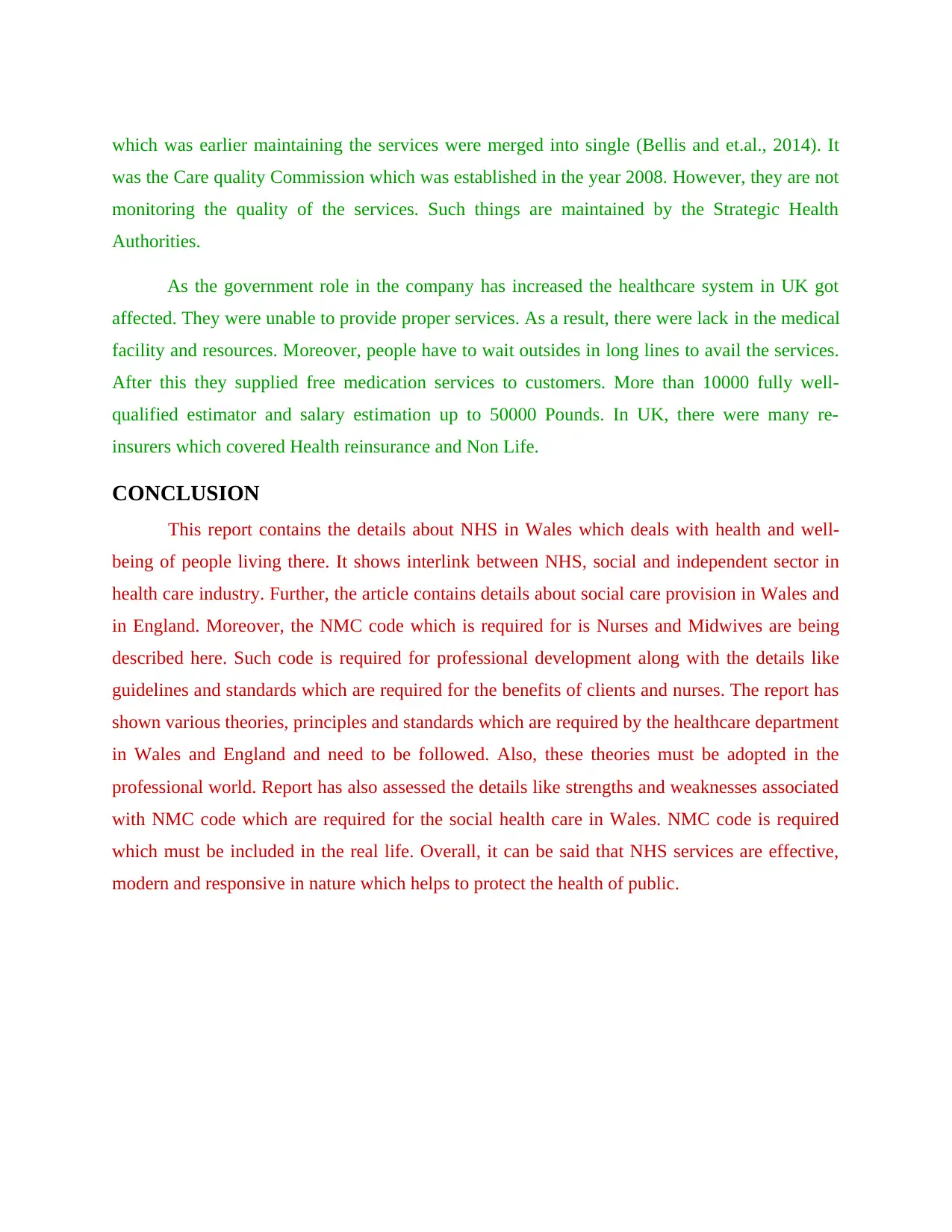
which was earlier maintaining the services were merged into single (Bellis and et.al., 2014). It
was the Care quality Commission which was established in the year 2008. However, they are not
monitoring the quality of the services. Such things are maintained by the Strategic Health
Authorities.
As the government role in the company has increased the healthcare system in UK got
affected. They were unable to provide proper services. As a result, there were lack in the medical
facility and resources. Moreover, people have to wait outsides in long lines to avail the services.
After this they supplied free medication services to customers. More than 10000 fully well-
qualified estimator and salary estimation up to 50000 Pounds. In UK, there were many re-
insurers which covered Health reinsurance and Non Life.
CONCLUSION
This report contains the details about NHS in Wales which deals with health and well-
being of people living there. It shows interlink between NHS, social and independent sector in
health care industry. Further, the article contains details about social care provision in Wales and
in England. Moreover, the NMC code which is required for is Nurses and Midwives are being
described here. Such code is required for professional development along with the details like
guidelines and standards which are required for the benefits of clients and nurses. The report has
shown various theories, principles and standards which are required by the healthcare department
in Wales and England and need to be followed. Also, these theories must be adopted in the
professional world. Report has also assessed the details like strengths and weaknesses associated
with NMC code which are required for the social health care in Wales. NMC code is required
which must be included in the real life. Overall, it can be said that NHS services are effective,
modern and responsive in nature which helps to protect the health of public.
was the Care quality Commission which was established in the year 2008. However, they are not
monitoring the quality of the services. Such things are maintained by the Strategic Health
Authorities.
As the government role in the company has increased the healthcare system in UK got
affected. They were unable to provide proper services. As a result, there were lack in the medical
facility and resources. Moreover, people have to wait outsides in long lines to avail the services.
After this they supplied free medication services to customers. More than 10000 fully well-
qualified estimator and salary estimation up to 50000 Pounds. In UK, there were many re-
insurers which covered Health reinsurance and Non Life.
CONCLUSION
This report contains the details about NHS in Wales which deals with health and well-
being of people living there. It shows interlink between NHS, social and independent sector in
health care industry. Further, the article contains details about social care provision in Wales and
in England. Moreover, the NMC code which is required for is Nurses and Midwives are being
described here. Such code is required for professional development along with the details like
guidelines and standards which are required for the benefits of clients and nurses. The report has
shown various theories, principles and standards which are required by the healthcare department
in Wales and England and need to be followed. Also, these theories must be adopted in the
professional world. Report has also assessed the details like strengths and weaknesses associated
with NMC code which are required for the social health care in Wales. NMC code is required
which must be included in the real life. Overall, it can be said that NHS services are effective,
modern and responsive in nature which helps to protect the health of public.
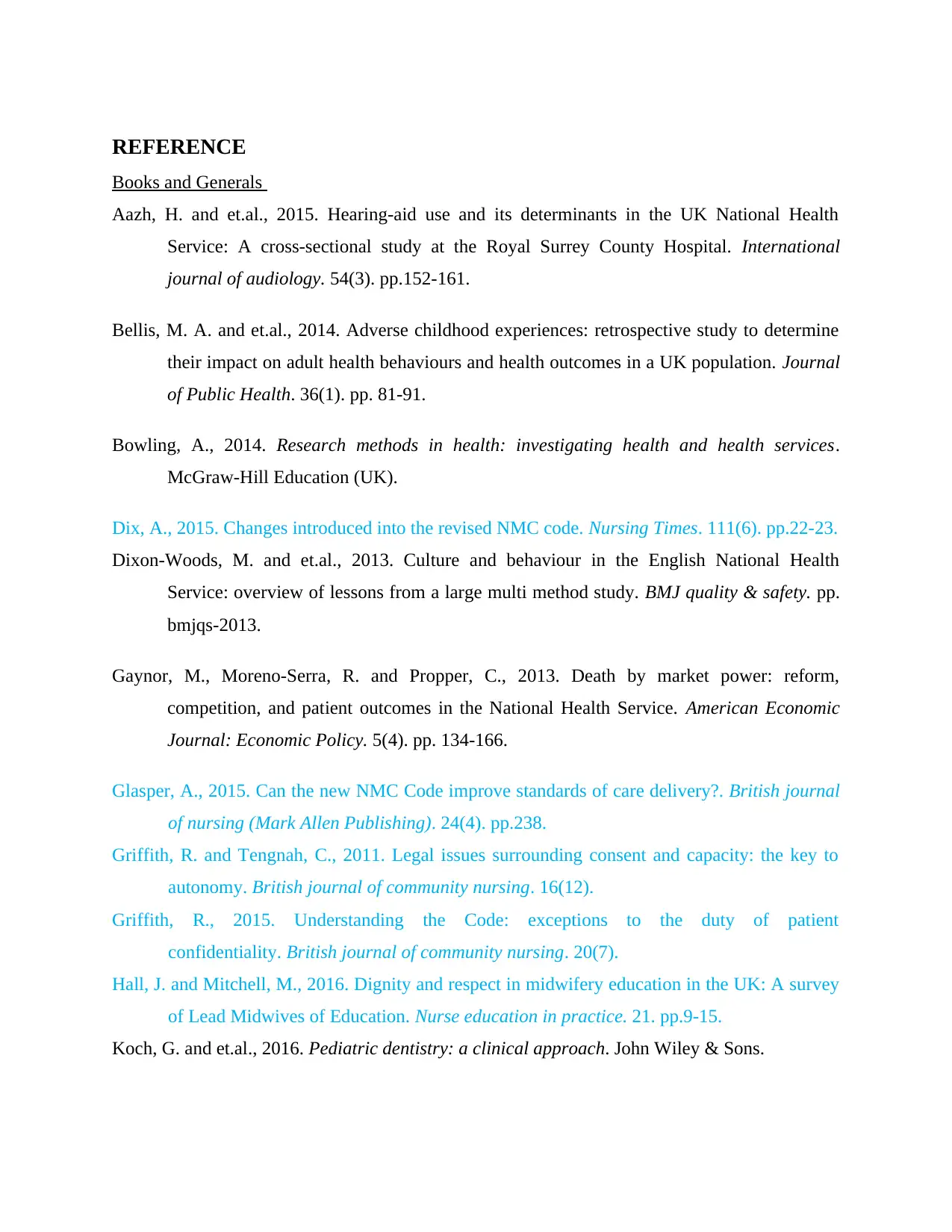
REFERENCE
Books and Generals
Aazh, H. and et.al., 2015. Hearing-aid use and its determinants in the UK National Health
Service: A cross-sectional study at the Royal Surrey County Hospital. International
journal of audiology. 54(3). pp.152-161.
Bellis, M. A. and et.al., 2014. Adverse childhood experiences: retrospective study to determine
their impact on adult health behaviours and health outcomes in a UK population. Journal
of Public Health. 36(1). pp. 81-91.
Bowling, A., 2014. Research methods in health: investigating health and health services.
McGraw-Hill Education (UK).
Dix, A., 2015. Changes introduced into the revised NMC code. Nursing Times. 111(6). pp.22-23.
Dixon-Woods, M. and et.al., 2013. Culture and behaviour in the English National Health
Service: overview of lessons from a large multi method study. BMJ quality & safety. pp.
bmjqs-2013.
Gaynor, M., Moreno-Serra, R. and Propper, C., 2013. Death by market power: reform,
competition, and patient outcomes in the National Health Service. American Economic
Journal: Economic Policy. 5(4). pp. 134-166.
Glasper, A., 2015. Can the new NMC Code improve standards of care delivery?. British journal
of nursing (Mark Allen Publishing). 24(4). pp.238.
Griffith, R. and Tengnah, C., 2011. Legal issues surrounding consent and capacity: the key to
autonomy. British journal of community nursing. 16(12).
Griffith, R., 2015. Understanding the Code: exceptions to the duty of patient
confidentiality. British journal of community nursing. 20(7).
Hall, J. and Mitchell, M., 2016. Dignity and respect in midwifery education in the UK: A survey
of Lead Midwives of Education. Nurse education in practice. 21. pp.9-15.
Koch, G. and et.al., 2016. Pediatric dentistry: a clinical approach. John Wiley & Sons.
Books and Generals
Aazh, H. and et.al., 2015. Hearing-aid use and its determinants in the UK National Health
Service: A cross-sectional study at the Royal Surrey County Hospital. International
journal of audiology. 54(3). pp.152-161.
Bellis, M. A. and et.al., 2014. Adverse childhood experiences: retrospective study to determine
their impact on adult health behaviours and health outcomes in a UK population. Journal
of Public Health. 36(1). pp. 81-91.
Bowling, A., 2014. Research methods in health: investigating health and health services.
McGraw-Hill Education (UK).
Dix, A., 2015. Changes introduced into the revised NMC code. Nursing Times. 111(6). pp.22-23.
Dixon-Woods, M. and et.al., 2013. Culture and behaviour in the English National Health
Service: overview of lessons from a large multi method study. BMJ quality & safety. pp.
bmjqs-2013.
Gaynor, M., Moreno-Serra, R. and Propper, C., 2013. Death by market power: reform,
competition, and patient outcomes in the National Health Service. American Economic
Journal: Economic Policy. 5(4). pp. 134-166.
Glasper, A., 2015. Can the new NMC Code improve standards of care delivery?. British journal
of nursing (Mark Allen Publishing). 24(4). pp.238.
Griffith, R. and Tengnah, C., 2011. Legal issues surrounding consent and capacity: the key to
autonomy. British journal of community nursing. 16(12).
Griffith, R., 2015. Understanding the Code: exceptions to the duty of patient
confidentiality. British journal of community nursing. 20(7).
Hall, J. and Mitchell, M., 2016. Dignity and respect in midwifery education in the UK: A survey
of Lead Midwives of Education. Nurse education in practice. 21. pp.9-15.
Koch, G. and et.al., 2016. Pediatric dentistry: a clinical approach. John Wiley & Sons.
⊘ This is a preview!⊘
Do you want full access?
Subscribe today to unlock all pages.

Trusted by 1+ million students worldwide
1 out of 14
Related Documents
Your All-in-One AI-Powered Toolkit for Academic Success.
+13062052269
info@desklib.com
Available 24*7 on WhatsApp / Email
![[object Object]](/_next/static/media/star-bottom.7253800d.svg)
Unlock your academic potential
Copyright © 2020–2025 A2Z Services. All Rights Reserved. Developed and managed by ZUCOL.




